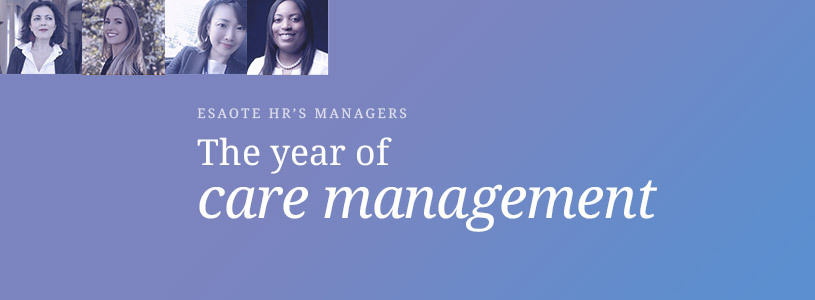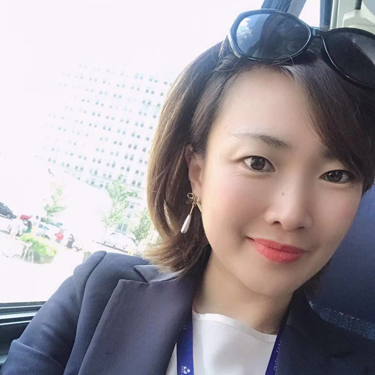
2020 tested the strength of the trust relationship between employees and organizations. Esaote responded in a timely manner with various tools.
We asked our HR staff to tell us how their teams have coped with the change, what has changed in this challenging historical transition, and what has become entrenched in the awareness that was already there. We chose a few questions to conduct a shared reflection on what happened in our organisation from different perspectives. We are a network of people working from all around the world who exchange experiences, solutions and questions; we do this in the knowledge that only by doing so can individual energies build innovation and shared well-being. HR is the "satellite dish" of how we make work sustainable, and there is no raw material more valuable than human energy. This is a concept that we often hear, but it is a thought that we want to reiterate internally continually, and these sharing opportunities also serve this purpose.
We would like to thank the four representatives who play such an important role at Esaote, which is now at the centre of many new developments. Here are their recaps on this challenging year.

 1. "A balanced mix of online and face-to-face meetings should work ideally."
1. "A balanced mix of online and face-to-face meetings should work ideally."
Ankie Kollau - HR Business Partner - The Netherlands
 2. "When there is trust between employee and company, we become more confident to embrace the new challenges..."
2. "When there is trust between employee and company, we become more confident to embrace the new challenges..."
Jojo Wang - Human Resources Director - China Mainland
 3. "We found new ways to collaborate despite the distance."
3. "We found new ways to collaborate despite the distance."
Shannon Arrington - Human Resources Manager - North America
 4. "Our trump cards were flexibility and the ability to adapt to new situations."
4. "Our trump cards were flexibility and the ability to adapt to new situations."
Elisabetta Pinna - Corporate HR Manager & HR Manager WE
"A balanced mix of online and face-to-face meetings should work ideally."
Ankie Kollau - HR Business Partner - The Netherlands

Ankie Kollau - HR Business Partner - The Netherlands
What, in your experience, was experienced as a more traumatic situation or a condition that made employees feel change urgent? How was this sudden shock absorbed? What were the personal resources that people seemed to have drawn on the most and which proved to be functional?
2020 was, of course, the year no one expected; Covid-19 happened and had, still has, a huge impact on the world. Thankfully, we didn't experience a traumatic situation. We can say 2020 was a year that required changes and adaption.
We introduced Remote Working; our employees started to work as much as possible from home on voluntary basis. Our plant in Sittard worked with 2 shifts during several months. The adaption from working at the office for 40 hours per week to working from home and using Microsoft Teams as a primary communication tool most of the time went quick.
In this year has there inevitably been a negotiation in managerial decisions between the needs of the individual and the needs of the organization and the community within it? How did the individuals respond to the needs of the group and which organizational tools were the most appreciated by Esaote people?
We experienced a few employees were lonelier and missed the interaction with their colleagues, managers stimulated their employees to come to the office once (or more) per week. Most of them did, all in a safe and responsible way, of course. During the year, we realized COVID-19 wasn't a temporary situation that would last only a few weks. We needed to create long-term plans and policies, also legally. Setting up a Remote Working Policy, also for post-covid, containing loaned PC's, monitors and chairs became the new standard.
At the end of 2020 we showed our appreciation for the support of our employees during the Christmas speech and with a present for our employees.
This particular year has brought out what is really important and what is negligible. Are there things that came to light in the emergency situation that you no longer want to give up and things that you don't want to return to?
The most important thing is a healthy, happy and safe life; as employer, we have a responsibility to take care of our employees, keep them safe and, above all, keep them happy. Things such as extra attention or even a chair, for example, to work better from home are mandatory to help our employees. 2020 was a tough year spent in lockdown; employees with young children were absolutely challenged. Using Microsoft Teams is a positive development, it saves time because we do not spend hours driving to meetings; but, there is a downside, only online contact will not be ideal in the future. A balanced mix of online and ‘face-to-face’ meetings should work ideally.
We can definitely say Remote Working is normalized and with the new policy a flexible benefit of our labor conditions. Working only at the office from 9-to-5 is history, the private-work life balance will and deserves more priority. COVID-19 required us, as employer, to speed up the process.
"I can say for myself I've seen a lot of kindness and empathy on a daily base."
What facilitated internal cohesion and, therefore, needs to be further developed?
Our employees have a high sense of responsibility and took Remote Working very seriously; we are thankful for their flexibility and adaptive mindset. Also, we see that everyone became more tolerant of their colleagues’ personal matters. I can say for myself I’ve seen a lot of kindness and empathy on a daily basis. We have seen a lot of positive changes such as kindness and new policies and technologies to resume business and growth.
But, we have to keep in mind that we don't know what the effects will be in the long term, especially flexibility. While being engaged to Esaote, flexibility is a positive quality, but there might be a risk in the long term. Protecting our employees will be a long-term high priority.
Furthermore, the office should always be a safe place to work; mapping the short and long-term needs of both employees and Esaote will be more important in the future.
"When there is trust between employee and company, we become more confident to embrace the new challenges..."
Jojo Wang - Human Resources Director - China Mainland

Jojo Wang - Human Resources Director - China Mainland
What, in your experience, was experienced as a more traumatic situation or a condition that made employees feel change urgent? What were the personal resources that people seemed to have drawn on the most and which proved to be functional?
I would like to say, fear was the greatest difficulty for everyone in China especially for the people of Wuhan when the epidemic was first confirmed by medical experts. "Block" is a word that was not heard of for decades. Wuhan was the first city and China was the first country to be defined with virus; no matter how, after one year, scientists all over the world demonstrated that China is not the first country to break out in epidemic, the very beginning psychological situation is traumatic.
The two H-words: “horror” and “hopelessness”controlled the minds of many people. At this time, information and communicaiotn are crucial. We need to convert people's attention from horror to help. With purpose to help people, we organized a series of works to encourage our people to fight for the epidemic. These people were suddenly shock absorbed because they felt more responsible to contribute instead of hesitation.
This particular year has brought out what is really important and what is negligible. Are there things that came to light in the emergency situation that you no longer want to give up and things that you don't want to return to?
When it comes to ways to cope with difficulties, the sense of trust is of great importance. Trust is the basis of all relationship and interactions. If a community or an organization can foster a strong sense of trust, a number of benefits can be seen such as productivity, working efficiency, morale improvement, time reduction in discussion and decision-making. Not only that, when trust is built between employee and company, we become more confident to embrace the new challenges and have a clearer vision of what the company stands for.
The last thing we want to return to is failure of communication. When coworkers fail to communicate thoroughly and effectively, the results are very detrimental. Communication is needed every day in every environment. It could be a slight nod in agreement or information presentation to a large group. Communication is definitely necessary in relationship building, idea sharing and team management. Lack or failure of communications brings out a lot of troubles including misunderstanding, conflicts, engagement reduction and similar traumatic situations.
"I can say for myself I've seen a lot of kindness and empathy on a daily base."
What facilitated internal cohesion and, therefore, needs to be further developed?
There were three different cohesion tools
Employee relationship activities
We got good feedback from employees in the following two activities.
- Castellano Award: At the end of 2020, ESAOTE China awarded the "Castellano Award" to employees who have been in service for many years. This award shows the company's recognitions of the employees who have been in service for a long term.
- Remember separated employees: this means not engaging only our current employee, but also former employees, it's a part of Employer Brand Building. New Year blessing and gifts to former employees let them know that ESAOTE misses them and always welcome them back to Esaote. This activity is also an employer brand building approach.
Organizational Culture
Determine a positive organizational culture that incentives employees to seek both organizational and personal objectives. Enhance employee engagement and form a good orientation within the company.
Improve job satisfaction
Job satisfaction could improve employees' achievement of objectives, (including organization relationship, welfare, contribution reward, psychological pressure, etc.)
"We found new ways to collaborate despite the distance."
Shannon Arrington - Human Resources Manager - North America

Shannon Arrington - Human Resources Manager - North America
What, in your experience, was experienced as a more traumatic situation or a condition that made employees feel change urgent? What were the personal resources that people seemed to have drawn on the most and which proved to be functional?
The onset of COVID-19 in the U.S. was a very traumatic situation that required immediate attention. It resulted in the sudden shutdown of the U.S. and also the ENA Fishers headquarters. It was critical that we acclimate to the changes and develop alternative methods to continue business operations.
We shifted to a remote working environment for those that could perform their jobs from home while essential personnel continued to report to the office. We put many measures in place in the office to protect our employees and their well-being. In addition to providing personal protective equipment and sanitizer, we installed plexiglass barriers in our office space to prevent cross-contamination between employees seated near one another. Once we reopened the office, we instituted a staggered attendance policy so that no one was working directly next to another employee.
Much of our U.S. workforce was working remotely prior to COVID-19 but I believe these changes were appreciated and well received by the Fishers office employees.
In this year has there inevitably been a negotiation in managerial decisions between the needs of the individual and the needs of the organization and the community within it? How did the individuals respond to the needs of the group and which organizational tools were the most appreciated by Esaote people?
One major decision we had to make was to determine which employees were deemed essential to business operations. We ultimately decided that our Operations and Traffic teams should continue to report to the office on a daily basis. Those jobs just simply could not be completed remotely. Those individuals understood the importance of their roles and there was no disagreement regarding reporting to the office.
Since the school system was also affected, we made accommodations for those with school aged children to continue working remotely without reporting to the office. This allows them to educate their children in the home while still completing their job functions remotely.
Another major success to mention: ENA was able to retain its entire workforce throughout the pandemic and did not resort to layoffs or furloughs. We've even welcomed a few new employees to our team during this time.
"The distance required us to communicate more frequently, whether answering questions or providing updates. This resulted in a more cohesive team."
What fundamental awareness emerged this year do you want to convey to the other teams?
During this time, we have learned that our team can be just as effective while working remotely. We found new ways to collaborate despite the distance. We utilized tools not previously used and created new ways to accomplish tasks. In light of the pandemic, we have discovered that it is possible to have effective communication without being physically present. Microsoft Teams has been an extraordinarily helpful tool during this time.
“Our trump cards were flexibility and the ability to adapt to new situations.”
Elisabetta Pinna - Corporate HR Manager & HR Manager WE

Elisabetta Pinna - Corporate HR Manager & HR Manager WE
In your experience, what was the most traumatic situation or condition that made employees feel the urgency for change? How was this sudden shock absorbed? What personal resources did people seem to draw on the most and which proved to be functional?
Change is a phenomenon that affects individuals, groups and organisations. Although change is an ever-present element in our lives, managing it is far from easy, especially in business.
As HR Manager of Western Europe, I interface with branches that have two main types of workers. On the one hand, we have home-based staff.
These employees make up a network of salespeople and technicians in the field, who have long been accustomed to working remotely, but who at the same time have always based a large part of the success and quality of their work on their presence at the customer's premises. The first difficulty for this staff was to suddenly find themselves in a situation where visiting hospitals, clinics, and doctors' offices was much more complicated and of personal concern.
On the other hand, we have a number of staff who, being also numerically small, had always been used to working in attendance at the local headquarters.
As a result, the former had to change their patterns concerning customer relations completely overnight, and the latter had to change their daily routine, learning to work remotely.
This was certainly very traumatic, especially initially, but the company reacted to the emergency with great responsiveness. Right from the start, we worked alongside the local Country Managers to understand their specific needs and provide them with our support. First and foremost, we tried to instil courage, keep on track, and act on two parallel but interrelated lines, balancing rescue and support in the short term with strategic review in the long term.
To give a few examples, we very quickly launched agile working in France and Spain for staff positions, we supported all local measures taken to inform resources about the pandemic and how to act so that workers could work safely and with as much peace of mind as possible, we supported several e-learning training initiatives, and we launched a language and digital training platform.
In this year's management decisions, has there inevitably been a negotiation between the needs of the individual and the needs of the organisation and the community within it? How have individuals responded to the needs of the group and which organisational tools have been the most appreciated by the people at Esaote?
Rather than negotiation, I'd say it was a mutual coming together: the company immediately understood the need to reorganise quickly and find new business opportunities, while at the same time guaranteeing its resources everything they needed: safe working conditions and adequate tools to manage change.
For their part, workers certainly appreciated the company's support; the technological tools made available for organising work from home and collaborating remotely were very successful, as was the related training provided. One positive aspect of this forced condition, among others, is that it has favoured and accelerated the exchange of best practices between teams and individuals who were already more “digitalised” and those who were more accustomed to traditional working models.
On a wider scale, however, I believe that, at a time of such a radical crisis, not only in terms of health but also of the economy, a very positive and reassuring factor for our workers was the knowledge that they were part of a strong company, whose business model was not called into question, and with a solid management that handled the emergency with clear thinking and effectiveness; all this, combined with the strengthening of the perception that everyone's individual contribution could make a difference, strengthened the bond with the company and, in turn, encouraged employees to make a great effort to react promptly and adapt quickly.
This unusual year has highlighted what is really important and what is negligible. Are there things that emerged in the emergency situation that you don't want to give up and things that you don't want to go back to?
The eventual and future return to normality will be different. The need for employees to have a sustainable and satisfying work-life balance emerged. Individuals faced many challenges during the lockdown, but certainly also had the opportunity to rediscover the value of family time, the advantages of not spending hours every day on public transport or in the car to get to work, and the importance of the quality of human relationships, including those with colleagues.
We will certainly not return to normality in the future, but to a new dimension. The change initially experienced was very radical, given the emergency; once the situation was under control, and we began to alternate working from home with working in offices or in the field, we were able to combine the best practices of the past with those of the present: for example, choosing presence and direct contact when the quality of work is truly positively impacted, and perhaps carrying out activities from home that would have been done differently before the pandemic, but which in the emergency we learned to manage just as effectively with other means. However, at the moment there is certainly a clear feeling that, along with all the hardships, the pandemic has also generated some good. Like some kind of small positive legacy.
Working from home will certainly become more natural for everyone. If there is one thing we have discovered in droves, it is that encouraging working from home has turned out to be much easier than we originally thought.
“…it is HR's job to nurture the imagination”
The use of IT tools, including virtual meetings, will certainly no longer be abandoned. Video calls have taught us that you can solve the same problems, with the same efficiency, in half the time.
In my opinion, we will not give up physical meetings, which have always been an important asset for our sales force, but they will certainly be supported by virtual meetings. Perhaps no opportunity will be given up, but all opportunities, old and new, will be integrated. We will certainly enhance the collaboration with Corporate, which emerged from this time of difficulty to exchange views and which has consolidated the team, especially in WE.
The world is changing fast nowadays and we want and need to be ready to change with it, not by being subjected to events, but by playing an active role.
The realisation that it is HR's job to nurture the imagination, to cultivate a different outlook on life and the organisation, to make people understand that circumstances eventually change not only by their own power but also and above all because people face them by pursuing and understanding value.
We are not losing something, we are building and rebuilding a new world.
Read MORE posts
Smart organisation in a nutshell
Esaote is on the path towards becoming a smart organisation. As part of this, it is helping HOFs and middle managers to experiment with the old vocabulary in a new way...
Wellbeing: because we need to believe that the company wants us to be happy
Employee satisfaction is not just a benefactor's habit but is a real investment to move forward in increasingly unstable markets...
Beyond the pandemic. The concept of syndemics and aspects of anthropology in medicine.
We simultaneously form part of multiple systems: every decision and choice we make has repercussions on the lives of other living beings and triggers changes in one or more of the environments we inhabit (economic, natural, social, health, etc.)...


